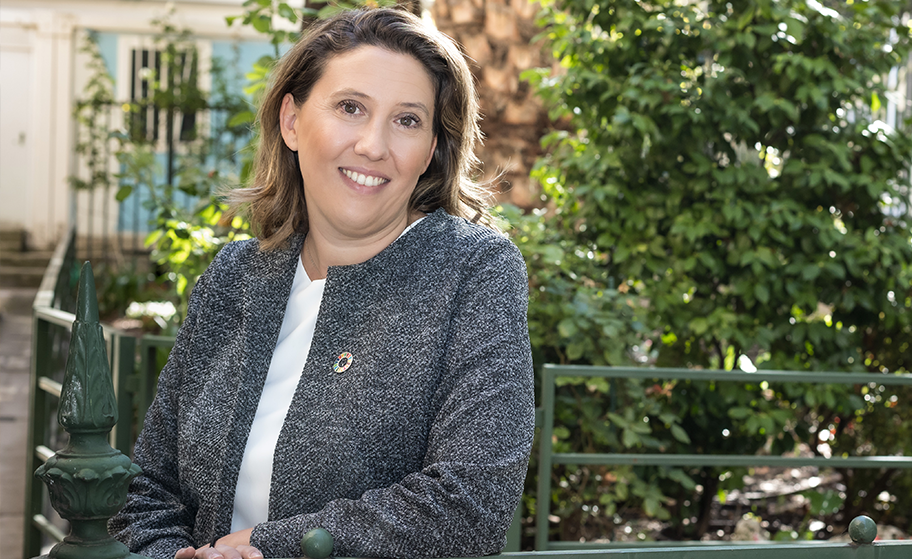Cristina Sánchez is the Executive Director of the UN Global Compact Spain. With an outstanding track record in the organisation since 2007, she leads the team, manages strategic alliances and designs outreach activities to attract new partners. She has also served as Spain’s representative to the UN Global Compact and has a strong academic background, including a degree in history and masters’ in contemporary European studies and international relations.
In this interview she explains the diversity approach included in the 2030 Agenda and its importance in organisations. She also talks about the competitive advantages of diversity and its contribution to the transition to a sustainable, decarbonised and equitable model.

In 2015, the 2030 Agenda was created to transform the world into a more sustainable place, leaving no one behind. The concept of inclusion is therefore in its name. For the UN Global Compact Spain, “leaving no one behind” is a mantra and one of the fundamental pillars for articulating the actions of all stakeholders, including, with great importance, companies. And we can say that diversity is a cross-cutting aspect of the Agenda for Humanity, with implications for all the Sustainable Development Goals.
For some SDGs, the concept of diversity is their raison d’être. For example, SDG 10 Reduced inequalities, aims to end inequalities in access to economic opportunities, participation and inclusion, regardless of origin, race or ability; or that all people have equal access to services and protection.
SDG 5 Gender equality aims to ensure that men and women enjoy equal rights. According to SDG 8 Decent work and economic growth, decent working conditions must be ensured for the entire workforce. Diversity is also addressed in SDG 4 Quality education by offering scholarships or programmes to people in vulnerable situations, and in SDG 1 No poverty by supporting projects in vulnerable environments, to name but a few.
Diversity is a cross-cutting aspect of the Agenda for Humanity, with implications for all SDGs
Implicit in all of these goals is the protection of the rights of people who may be discriminated against on the basis of gender, race, sexual orientation or disability.
At the Global Compact we like to put it this way: diversity is about counting on people, inclusion is about making people count. These two concepts must go hand in hand.
But in order to take action and integrate them into companies, it is necessary to start by knowing and understanding the Sustainable Development Goals. The company needs to commit to them, carry out mapping to know the state of diversity and inclusion within the company, design an improvement plan with concrete and measurable targets. And finally, reporting to stakeholders. Protecting diversity must be at the heart of the company’s culture and be embedded in many decision-making processes.
Diversity is about counting on people; inclusion is about making people count
In our annual report, “Comunicando el Progreso 2022. Renovando las reglas del reporte empresarial” (Communicating Progress 2022: Renewing the Rules of Business Reporting), we found that UN Global Compact Spain and IBEX 35 companies have increased diversity and inclusion training for their workforces. Specifically, 31% of Global Compact companies have already done so, and 44% of large companies have done so, up 6 points from last year.
In the case of SMEs, however, we have not seen any increase in this indicator. This is a challenging figure, given that small and medium-sized enterprises make up 98% of the business fabric in our country.
We found a wide variety of benefits in companies that pursue diversity initiatives. On our COMparte platform, you can find many examples of specific actions taken by companies that are part of the UN Global Compact Spain, as inspiration.
When we talk about diverse and inclusive companies, it gives them a certain prestige that allows them to attract and retain new talent. In addition, a company that is committed to diversity has a more motivated workforce, willing to give their best and to contribute new ideas. Their creativity and innovation is encouraged because the company demonstrates that people can be themselves at work. A working environment that fosters diversity facilitates employee satisfaction and work-life balance, but also ensures compliance and avoids legal risks.
In addition to all these competitive advantages, there are others such as new business opportunities through access to other markets and improved customer focus. We are clearly talking about benefits that position companies and create new business opportunities.
A working environment that promotes diversity facilitates employee satisfaction and work-life balance
The answer is clear: by focusing on the strengthening of human rights. Putting people first. To begin with, making organisations more diverse is already being more sustainable. We can look at this issue in two ways. On the one hand, transforming our model is the biggest challenge, and we have to face it together. No individual actions can provide an exclusive solution. Diversity helps us to deal more efficiently with the challenges we face, improves results and facilitates decision-making. From this point of view, the more diverse the people who devise and implement solutions to challenges, the more coherent they will be.
But in another sense, it has been proved that the adverse effects of this model from an environmental or economic point of view have a more severe impact on already vulnerable groups. For example, the pandemic has wreaked more havoc on women; climate change has a specific impact on impoverished people; wars do the same on migrant populations… Therefore, addressing diversity and protecting the rights of all people with a focus on inclusiveness will make us all more resilient to the negative effects of the environment, economic crises or the inevitable processes of just transition.